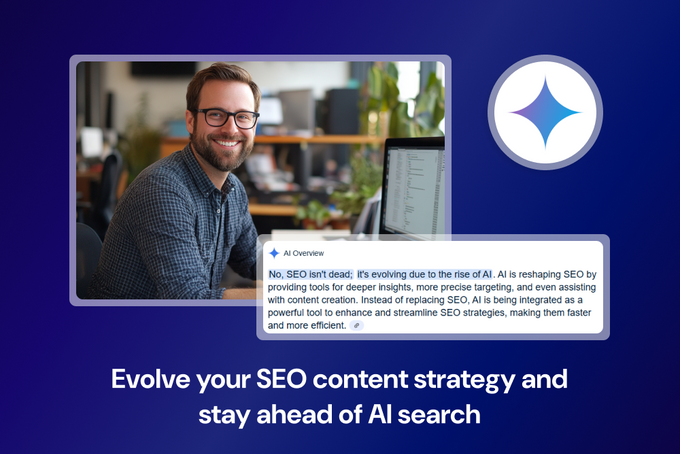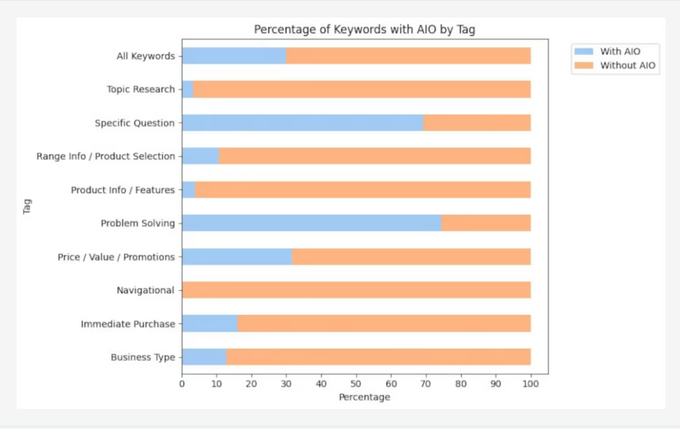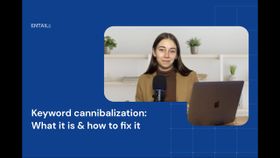AI for SEO: Should you change your SEO content strategy?
Learn how AI is reshaping search engine optimization and why adapting your content strategy is essential for success.
Updated July 18, 2025

AI Summary
The search industry can't stop talking about AI, and for good reason. As search engines increasingly integrate AI into their algorithms, SEO professionals face a new reality where traditional optimization tactics may no longer yield the same results. This shift affects everything from content creation to conversion rate optimization.
If you're wondering whether this shift matters for your business, the answer is yes, it absolutely does. But before overhauling your entire strategy, let's understand what's happening and what you should actually do about it.
Key takeaways
- Content that shows expertise and answers user questions is essential for AI-driven search.
- Technical SEO remains important, but won't drive traffic without quality content that meets user intent.
- AI-generated content without unique value risks penalties and poor performance in search results.
- Less than 10% of websites succeed at generating traffic with AI-optimized content, but the right tools can help fix this.
Understanding the rise of AI in search
Search engines have evolved dramatically since the early days of simple keyword matching. Today's search algorithms use sophisticated AI systems to understand content context, user intent, and content quality in ways that were impossible just a few years ago.
From keywords to context
Google's journey into AI began with the introduction of RankBrain in 2015, which helped the search engine understand the context behind queries. Since then, AI has become increasingly central to how search engines function.
Modern search algorithms don't just match keywords. They understand concepts, relationships between topics, and the nuanced intent behind search queries.
For example, when someone searches "apple nutrition," the search engine can differentiate between the fruit and the tech company without relying on exact keyword matches.
AI overviews
One of the most visible signs of AI's growing role is the appearance of AI overviews, also called Search Generative Experience (SGE), in search results.
According to recent research by Authoritas, these AI-generated summaries now appear in approximately 30% of search results.
These overviews aim to answer user queries immediately without requiring users to click through to websites. While they don't appear for every search, they're most common for:
- Problem-solving queries (74% of such searches)
- Specific questions (69% of these searches)
- Mid-range search volume terms (those with 500-2,400 monthly searches)
This development is significant because these AI overviews often push traditional organic results further down the page, sometimes below the fold entirely.
Source: Authoritas
» Learn how AI Overviews impact search performance for B2B vs. B2C sites.
Natural language processing
Perhaps the most transformative aspect of AI in search is the improved ability to understand natural language. Search engines can now process conversational queries, understand synonyms and related concepts, and even interpret the emotional context of content.
This means that content optimized purely for keywords without addressing the underlying user need will struggle to perform well.
How is AI affecting SEO?
AI's integration into search is changing SEO in several fundamental ways.
Content evaluation has become more sophisticated
Search engines can now evaluate content quality based on factors far beyond keyword density. They assess how comprehensively a page addresses a topic, the accuracy of information provided, whether the content demonstrates genuine expertise, and user engagement signals across the web.
This means that thin content created primarily for search engines rather than users is increasingly ineffective.
Content creation and optimization are evolving
AI is not just changing how search engines work, it's transforming how content is created. AI writing tools can help generate outlines, draft content, and suggest optimizations.
However, this widespread access to AI tools means the bar for quality has risen significantly. Content that simply meets basic optimization criteria is no longer enough to stand out.
Search engines can now detect patterns in AI-generated content that lacks unique value or expertise. This means differentiation through original research, unique perspectives, and genuine expertise is more important than ever.
Data analysis capabilities have expanded
AI has dramatically improved our ability to analyze search data and user behavior. SEO professionals now have access to tools that can identify patterns, predict trends, and provide deeper insights into content performance.
This shift means successful SEO requires more sophisticated data analysis, from understanding which topics are gaining momentum to identifying content gaps and optimization opportunities at scale.
Keyword research has become more contextual
Traditional keyword research focused on search volume and competition metrics. Today's AI-powered tools analyze the semantic relationships between terms, topic clusters, and user intent patterns.
This enables a more sophisticated approach to keyword targeting that focuses on topical authority rather than individual keywords. SEO strategies now need to consider the entire ecosystem of terms surrounding a topic.
Focus on E-E-A-T matters more than ever
With AI's ability to better assess content quality, Google's emphasis on Experience, Expertise, Authoritativeness, and Trustworthiness (E-E-A-T) has become even more critical.
AI systems can better identify authentic content from content that mimics the language of experts. This puts a premium on content created by true subject matter experts who provide unique insights and perspectives.
» Find subject matter experts to create content that ranks.
Understanding of user intent has improved
AI enables search engines to understand the intent behind queries with much greater accuracy. This means content must align precisely with what users are actually looking for, and not just what keywords they're using.
For example, if someone searches "best running shoes," the search engine understands they're looking for recommendations, comparisons, and possibly pricing information, not just pages that repeat the keywords "best running shoes" throughout the text.
Technical SEO remains important
While AI has transformed how content is evaluated, technical SEO fundamentals remain vital. In fact, with AI's improved ability to understand content, having an easily crawlable and technically sound website that can be discovered and indexed by Google becomes even more important.
Technical SEO ensures search engines can access, render, and understand your content, allowing the AI to properly evaluate it against competitor sites.
If Google can't crawl your site, your pages will most likely end up under the crawled but not indexed status in Google Search Console. Then, even the most brilliant content won't get the visibility it deserves.
The implications for your SEO content strategy
Given these changes, how should you adapt your SEO content strategy? Here are the key areas to focus on.
Shift from keyword-focused to intent-focused content
Rather than creating content around specific keywords, focus on addressing why users are searching in the first place. What problem are they trying to solve? What stage are they at in their user journey?
When you understand the real motivation behind searches, you can create content that truly resonates. This shift means researching the questions and concerns that surround your primary topics, not just the keywords with the highest search volume.
When you answer the questions users have, even those they haven't asked yet, you create content that naturally performs better with AI-driven search algorithms.
» Leverage user journey mapping to better understand user intent.
Prioritize quality, depth, and unique value
In an AI-driven search landscape, surface-level content that repeats common knowledge won't cut it anymore. Search engines can easily identify when content offers nothing new or valuable.
Instead, focus on creating comprehensive resources that tackle topics from multiple angles and provide insights users can't find elsewhere. This doesn't necessarily mean every piece needs to be 3,000+ words.
Rather, it means every piece should offer something genuinely valuable, whether that's a unique perspective, original data, or expert analysis that goes beyond the obvious.
As Google consistently emphasizes, they're looking for high-quality content that demonstrates E-E-A-T.
READ MORE: Generative engine optimization: What it is & how to do it
Leverage first-hand experience
AI systems are getting very good at distinguishing between content written from genuine experience and content that compiles information from other sources.
Content based on authentic first-hand experience, whether through case studies, original research, or expert insights, usually performs better.
This focus on experiential content aligns perfectly with Google's helpful content system, which aims to reward content created primarily for people, rather than for search ranking purposes.
When creating content, ask yourself: "Are we sharing information we've actually implemented or observed firsthand?" If not, think about how you might bring more authentic expertise into the process.
Structure content for enhanced visibility
With AI-generated overviews appearing in nearly a third of searches, how you structure your content can significantly impact its visibility. A clear, logical organization with descriptive headings helps AI systems understand your content's value.
For problem-solving and specific questions (where AI overviews appear most frequently), structure your content to provide direct, concise answers early.
This doesn't mean sacrificing depth, but organizing information in a way that both people and AI can easily navigate. Consider starting with a clear answer to the main question, then expanding with supporting details, examples, and nuance.
» Need more info on AI search? Explore the differences between ChatGPT search vs. Google.
Use AI tools strategically in your workflow
Despite the challenges AI presents to traditional SEO, it also offers powerful tools that can enhance your content strategy when used thoughtfully.
AI can help analyze vast amounts of search data to identify emerging trends, generate content outlines based on competitive analysis, suggest semantic keyword clusters, and streamline editing for readability and SEO best practices.
The key is using AI as a supplement to human expertise, not a replacement. The quality standards remain the same regardless of how you produce content. Tools should enhance your team's capabilities, not replace the human judgment, creativity, and expertise that ultimately differentiate great content.
» Stay ahead with AI-driven content strategy software.
Build comprehensive topic clusters
Rather than creating disconnected content pieces targeting individual keywords, focus on covering core topics relevant to your business. This approach demonstrates topical authority to AI algorithms while creating a more valuable resource for users.
Develop content clusters where in-depth pillar pages cover broad topics, with supporting content addressing specific subtopics and questions. This approach creates a network of semantically related content that both serves user needs and signals expertise to search engines.
» Create the right content based on the content marketing funnel.
Monitor SERP evolution and adapt
The search landscape is evolving faster than ever, and staying competitive requires continuous monitoring and adaptation.
Beyond traditional SEO metrics, track how often your content appears in AI overviews, how SERP features affect your click-through rates, and which content formats perform best for different query types.
Use these insights to refine your content strategy, adjusting topics, formats, and optimization approaches as search engine behavior changes. This data-driven approach will help you stay ahead of competitors as the AI-driven search ecosystem continues to develop.
SEE ALSO: What zero-click searches mean for your SEO strategy
Should you change your SEO content strategy?
Yes, but don't panic and throw everything out the window. The rise of AI-driven search requires some shifts in how we approach SEO, but the fundamentals that have always made content great aren't going anywhere.
What should stay the same
Good SEO fundamentals remain important to every type of content. That means:
- You should create helpful content that solves real problems.
- Keep your technical SEO solid.
- Build genuine expertise in your field.
- Demonstrate E-E-A-T in everything you publish.
These elements are timeless. The only difference is that they're just being evaluated with more sophisticated tools now.
What needs to change
Your approach to content creation needs to evolve. Here are a few areas to focus on:
- Move beyond basic keyword research to truly understand user intent.
- Show genuine hands-on experience that AI and Google can recognize and reward.
- Structure content to work well with AI systems.
- Use AI tools to enhance your work process, but not to replace human expertise.
The sites that will thrive aren't those with the most aggressive keyword strategy. They'll be the ones that genuinely help users, provide unique value, and demonstrate real expertise.
» Find out if there's a difference between GEO, AIO, and LLMO.
How to optimize for AI search
To succeed in AI-driven search, keep the following best practices in mind.
1. Create comprehensive content hubs
Instead of isolated articles targeting single keywords, build content hubs that cover topics thoroughly. This signals expertise to AI algorithms and helps users find everything they need in one place.
These interconnected resources, which include articles, videos, infographics, etc., also create a better user experience while demonstrating your site's authority on a specific topic.
2. Structure content for featured snippets
With AI overviews pulling information from across the web, make your content snippet-friendly. Answer questions clearly, use descriptive headings, and organize information logically.
This isn't about simplifying your content, but structuring it so both people and machines can navigate through it easily.
SEE ALSO: Are llms.txt files the missing link in AI-powered SEO?
3. Incorporate unique data and insights
Original research and expert analysis give you an edge in an AI search landscape. While AI can summarize existing information, it can't create new data or offer genuine expertise.
Share industry surveys, proprietary metrics, or experienced perspectives that only you can provide. These elements deliver value that AI can't replicate.
4. Optimize for conversational queries
Voice search has changed how people find information. Adjust by using natural language, addressing related questions, and providing straightforward answers.
This approach aligns with how AI systems understand intent and context, making your content more relevant in today's search environment.
Adapt your strategy for the future of SEO
Adapting your content strategy for AI search starts with assessing what you already have. Which content shows real expertise? Which offers unique value? Build on these strengths.
Next, identify gaps where you can show your knowledge while meeting user needs. Look for topics where your expertise provides genuine value that competitors don't offer.
Your content strategy should evolve with AI, but the goal remains the same: delivering exceptional value to your audience. When you focus on creating content that truly helps people, you're positioning yourself for success in the AI era.
» Need help optimizing your content strategy for the AI-driven search? Chat to an SEO expert.






